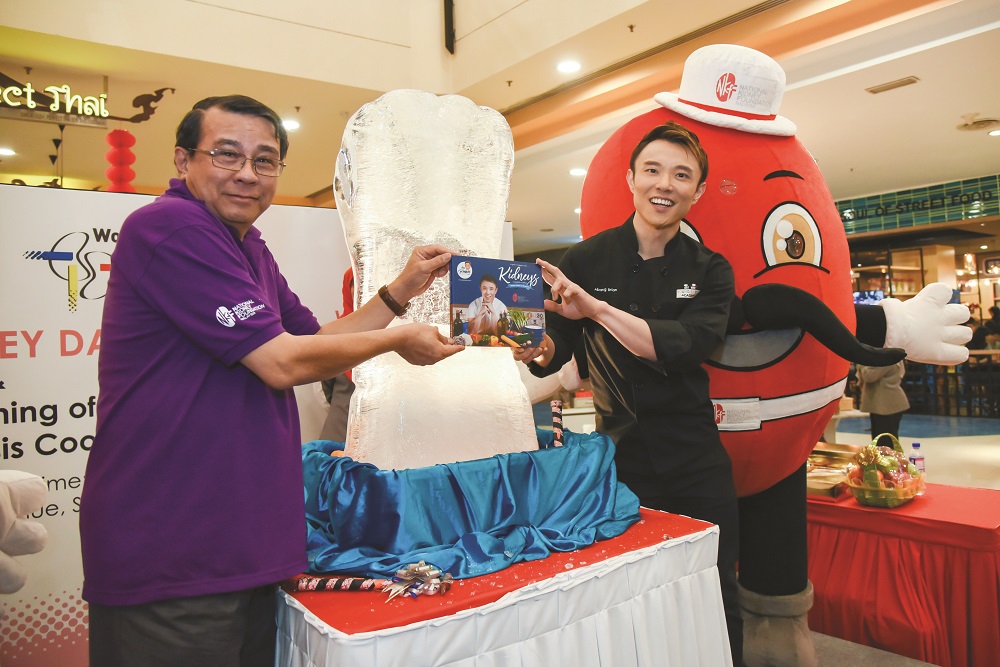KUALA LUMPUR, June 30 — Fact: Diseases are a pain.
It is an additional worry when someone has to change their lifestyle because of it.
Case in point are illnesses such as diabetes, high blood pressure and chronic kidney disease (CKD) where a patient has to probably change their lifestyle (if it has been an unhealthy one) and make extra effort when it comes to diet and exercise.
It is not an easy thing to do and every little assistance along the way can help.
With this in mind, the National Kidney Foundation (NKF) recently launched a recipe book, NKF Haemodialysis Cookbook.
The book was conceptualised for CKD patients and those on dialysis.
It was written in collaboration with Chef Brian Chen, an accountant who made it to the top eight of Masterchef Malaysia in 2011 and founded Young Chef Academy.
He said he was thrilled when he was approached by NKF to write the book but insisted on having a dietician (Kher Pui Ling) from the foundation to provide him the necessary advice and assistance.
“I knew many needed such a book,” he said.
His main objective in life that saw him switch fields from finance to what he calls “foodutainment” (a combination of food, education, and entertainment) was driven by his father’s illness.
Although they eventually lost him, it helped Chen realise that his life goal was to help others using the platforms he has.
“This conscious intention of mine live in the recipe books, TV and radio shows I do and the classes we teach at my cooking school for kids — Young Chefs Academy.”
He added that although this book project was a challenge, it was an inspiring journey that took nearly six months.
“It was indeed an amazing journey not only because the book is a meaningful one, which will go on to help many.
“But also the fact that after six books, this is my very first self-published book, for which I had a team to ensure its success; from inception, conceptualisation, materialisation to distribution.”
He and Kher ensured all the Malaysian food recipes that he came up with were in line with the dietary needs of CKD patients.
“Every ingredient and its nutritional values were scrutinised. For every rejected ingredient, I had to come up with a substitute that does not drastically affect the overall taste of the dish.”
He added that having tasty but healthy meals for kidney patients was about choosing the right ingredients where the nutritional contents match dietary needs and portion control.
Kher said she discussed with Chen on reducing portions or removing certain ingredients that are high in phosphorus or potassium.
This included replacing dairy products, phosphate-based baking powder, dried nuts, fruits and coconut with alternative ingredients.
“One example is carrot cake. I suggested to replace dried fruits, dried nuts, and baking powder with fresh fruits, and to use the egg stirring technique to ensure the cake is not dense.
“I also insisted he cut down on salt as this is crucial in keeping a patient’s condition stable.”

She said they also focused on reducing portions as patients needed to consume food moderately even though the recipes were improved.
NKF medical department head Dr Sivashanker Kanagasabapathy said a renal diet is essential in maintaining a patient’s optimal health and to slow down the progression to total kidney failure.
“Renal diet generally refers to the control of protein, phosphorus, potassium, sodium and fluid,” he said.
“However, it has to depend on individual conditions. CKD patients are advised to consult a dietitian to come up with a renal diet that is tailored to their needs.”
He added that exercise was generally important for those with CKD because decreased kidney functions affect muscles and bones.
“With regular exercise, they can help manage many of the health issues faced by kidney patients.”
However, he said it was important for patients to talk to their doctor before they started exercising.
He recommended patients start slowly and progress gradually to allow the body to adapt to the increased levels of activity.
He cautioned a patient to stop exercising when the dialysis schedule is changed, or he or she has a fever, facing hot and humid weather or has joint problems that worsened with exercise.
Dr Sivashanker said in terms of nutrition, the goals were to obtain optimal calories and nutrients from meals, manage salt intake and blood sugar levels if one has diabetes.
“For advanced CKD patients, you may need to watch out mineral (phosphorus, potassium) intake to minimise electrolyte imbalance in the body system.”
In terms of Malaysians controlling their CKD condition and diet, he said they were less likely to adhere to the recommended regimens.
“Dietary recommendations have been reported as the most difficult part of the treatment regimen because it affects food preference and altering lifestyle,” he said.
“Local studies have shown that approximately 64 per cent of dialysis patients do not comply with their prescribed diet.”
The book is priced at RM39.90 and available at nkf.org.my. It is also sold at Kinokuniya, MPH Bookstores and Popular Book Co.






















